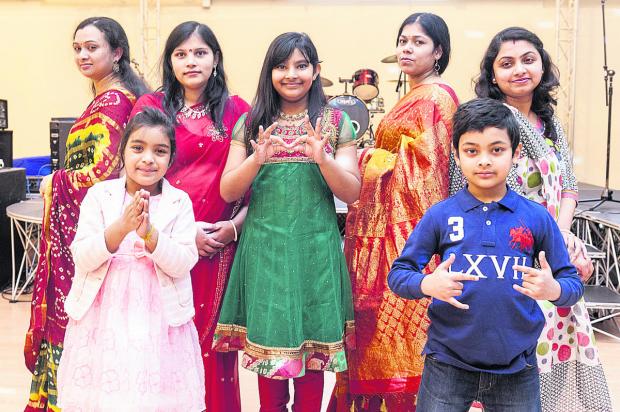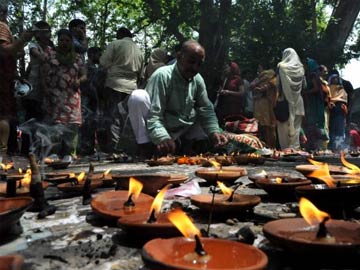
Calming the mind: Students at Daylesford's Dharma School begin their day with 15 minutes of meditation.
Photo: Angela Wylie
The dawn of a new day at the Daylesford Dharma School begins not with
the bark of an automated bell, nor with a loudspeaker, but with gentle
reverberations of a Tibetan singing bowl.
For the past five years, this traditional harmonic gong has
acted as the sign for children to line up outside, to quiet themselves,
before entering Australia's first (and only) mainstream Buddhist school.
The prep through grade 5 students - 40 of them begin term
one this week, up from 15 when the school opened in 2009 - then file
into the meditation room and find a comfy cushion on the floor.
''They know that it's a time of respect,'' said principal
Joel Hines. ''There's a bit of reverence for the space. The kids sit in
front of the altar - eyes closed, legs crossed, hands in lap - and take a
few deep breaths.''
Advertisement
There, under the watchful eye of the golden Buddha and the
Buddha of compassionate action, a small bell chimes, signalling the
start of morning meditation.
''They may be asked to imagine their family or friends in
front of them,'' Mr Hines said. ''Or to visualise a ball of light in
their hands - to feel it rise up and then send that positive energy or
golden light out to other beings - insects and animals and people in the
world.''
After 15 minutes comes the weekly themed ''awareness
program'', which could include anything from teachers role-playing an
act of generosity, to kids telling stories about kindness.
Then comes literacy and numeracy. This is a primary school,
after all. They stick to the national curriculum and consistently post
above-average results in NAPLAN data.
Lisa Brock of Hepburn Springs couldn't be happier with the
education Holly, 10, Anika, 8, and Mischa, 7, have received since they
came here in prep and began developing ''their own innate wisdom''.
Ms Brock considered schools in Daylesford, Hepburn Springs,
Yandoit, Drummond and Bullarto, but ultimately wanted intellectual
rigour with ''a more gentle beginning''.
''We wanted a place where we knew they would be nurtured like
they would at home,'' Ms Brock said. ''They encourage them to speak
their own truth.''
Dr Zane Ma Rhea of Monash University spent 18 months
researching the early days of the school, supporting the staff and
exploring how a mostly non-religious cohort of teachers could conduct
classes in a ''Buddhistic sort of way'' without turning it into a
religious school with monks for tutors.
Dave Edmunds has been teaching at the school for 18 months. A
former Xavier College boy raised Catholic in Brighton, Mr Edmunds said
the Dharma school doesn't push religion, but rather embeds a philosophy.
''You receive Buddhism almost by osmosis,'' said Mr Edmunds,
40, a typical spa country tree-changer who has been everything from
inner-city rocker and cycle messenger to barista and youth worker.
''Everything revolves around our five precepts - deep listening and
loving speech, generosity, body responsibility, mindful consumption, and
reverence for all life. There's a lot of cause and effect.''
Mindfulness is one of the new buzzwords in early years
education, but there are subtle extensions here including the ''conflict
resolution circle'' and the more intimate ''peace table'', where
children discuss the facts of any incident or act of aggression.
From fights to cliquishness, they talk through how it made
both parties feel, and how problems can be avoided. Kids in the older
grades recently started sitting down without staff, unprompted, running
their own dialogue.
The school is small, but specialist teachers come for Chinese
classes, violin and guitar lessons, and to supervise sport. Competition
is not discouraged. ''Our kids are incredibly physically active,'' said
school founder and former principal Andrea Furness. ''Losing with grace
and honour is something we teach.''
The school charges $2800 a year for full-fee-paying students,
which helps pay for the long-term lease on the quirky premises: the
school is housed inside the local tennis club social rooms. They have
two portable classrooms on site, courtesy of BER funding, and they mean
to expand.
A fund-raiser this month at the Quang Minh Temple in
Braybrook saw 350 people raise $15,000 towards the purchase of idyllic
forested land in nearby Musk.
Melbourne has taken notice of the model, too, with
Vietnamese, Thai and Sir Lankan communities planning two more Dharma
schools in Braybrook and Springvale. In Daylesford, there are plans for a
high school.
In the meantime, they have a perfectly sound home with the
town's best view of Wombat Hill. The vegie patch is burgeoning out back,
and there is a big Buddha out front, resting under a weeping cherry
tree.
It would be natural to fear that these children may get eaten
alive at high school, where ''unpacking your own reality'' is not
exactly part of the pre-teen lexicon. But, anecdotally at least, the
transition has been fine.
''There's always this idea that you're putting kids in a
bubble,'' Ms Furness said. ''But we hold them accountable to everything
they do. They know that kids can be nasty, and they have the language to
deal with that. We're actually smashing the bubble wide open.''
■konrad.marshall@fairfaxmedia.com.au
Twitter: @KonradMarshall
source: theage.com.au


































